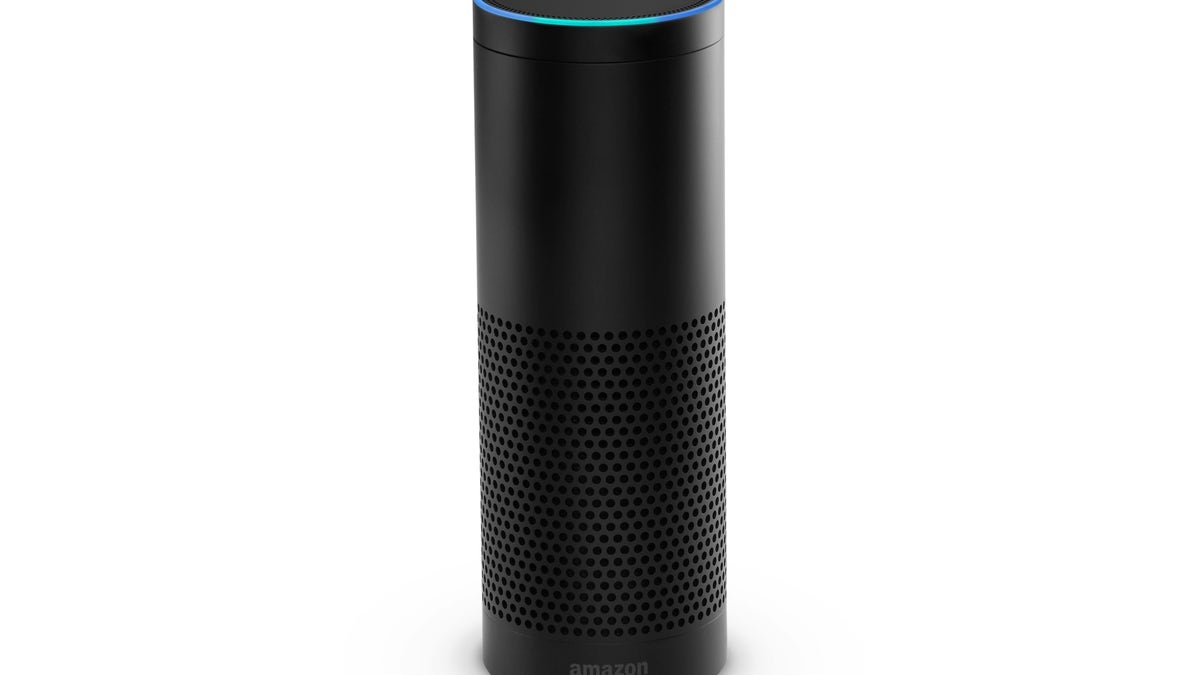
This product image provided by Amazon shows the Amazon Echo. (AP Photo/Amazon)
Yes, there's a lot to love about Alexa. The list of her skills grows daily. But one thing she can't do? Initiate a conversation. Now, that might be by design, as some people would it find it creepy -- or just plain irritating -- - to have Alexa start talking while they're in the middle of a phone call or TV show.
Yet if your voice assistant, be it Amazon Alexa or Google Home, could start talking of its own volition, it would actually be very useful. You probably already have breaking news alerts on your phone; Alexa could give you a quick audio update when something big is going down. You'd want to specially tailor these of course, because while, yes, I'm interested in knowing that four-billion-year-old fossils were found (a news alert that recently popped up on my phone from two different news sites), I don't need Alexa to tell me right now. Still, it's intriguing, right?
Amazon told me it can't speculate on what may or may not happen in the future, but there's been speculation that push notifications are coming for a few months now -- and it could really change the smart home, particularly as more appliances start using Alexa or Google Home to communicate.
Alexa, interrupting
More From Digital Trends
"Voice-controlled appliances have been in the works at GE for years, but it was all from the ground up, and it had never taken off," Lauren Platt, Lead Industrial Designer at GE Appliances, told Digital Trends. "It was expensive, and just not as finely tuned as it is now. And when the Amazon Echo launched, it gave us kind of a jumping off point." From Whirlpool to Samsung, manufacturers are working on ways to let you ask if your laundry is done before you lug the basket downstairs.
As part of the team working on voice integration, Platt had to figure out how to give Geneva, GE's Alexa skill, personality and purpose. "Voice control is useful when you're trying to accomplish a complex task and you're trying to simplify it using your voice," she said. With a single voice command, you could ask Alexa to instruct Geneva to preheat your oven to 350 degrees, set a timer for 45 minutes, and turn the temperature down to 175 degrees when there are 10 minutes left -- instead of you babysitting your appliance.
That still puts you in the driver seat, of course. Right now, if you want to know how many dishwasher pods you have left (GE has dishwashers that count them), you have to ask Alexa to ask Geneva. Instead, Alexa could let you know when you have five left, for example. "If you could have her chime in and tell you when your stuff is done and you don't have to directly call to her, that would be ideal," said Platt. "But I think there's a lot of ambiguity around that scenario that we would have to design through, because there's a lot of users who won't like that, and it will be polarizing, and we'll have to invent new methods."
How would Alexa know that you heard the notification, for example? Your Echo could listen for a few seconds after speaking for you to reply, "Thanks, Alexa." But how many notifications should it send, and how frequently, if you don't respond? Also, I've noticed an issue with Alexa's current follow-ups. If I ask my Dot to turn on my office light, it will say: "I found several devices matching that name. Which one did you want?" Before I can reply, it answers: "Sorry, I couldn't find a device or group named 'want' in Jennifer's account."
Auto-tuning through audio
If those issues get ironed out, Platt envisions something like this happening: You tell Alexa you're making Grandma's lasagna. She'll know what that means and set the oven temperature and a timer for you. Then, when you're finished eating, she would ask, "How was dinner?" If you respond that it was a little dry, "She could manipulate that recipe and change the amount of time or change the temperature it's cooking at and remember it for the next time," said Platt. Alexa could also tell the dishwasher -- perhaps silently -- to set itself to the pots and pans setting, since you've got a big dish with baked-on cheese ready for washing.
GE would set up these cause-and-effect scenarios, so you wouldn't have to. "The whole idea is taking that mental load away from the consumer and doing it ourselves, because we are the experts, we know all the settings," said Platt.
"That's kind of the beauty of where the voice control could be."




















